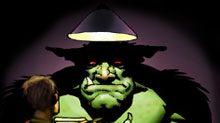 Did you expect Magic to become as big as it has?
Did you expect Magic to become as big as it has?
No. Every year it surprises me all over again, how big it is. From the beginning I expected Magic to be successful but I didnít know it would be, because there are a lot of good games that havenít been successful. But, even if I had known it was going to be successful, I couldnít have anticipated what became of it.
It must be overwhelming that the industry has grown to the size it has become.
Yeah, it is overwhelming, and sometimes I have these sort of sobering moments when I turn on the television and Iíll see, whatever, Yu Gi Oh television show and Iíll have this thought, ďWow!Ē Something like that may have existed without me but, itís like, ďI have something to do with that - even though itís several times removed.Ē And itís constantly these things which I realize are sort of little ripples off of Magic.
What has been the biggest surprise for you in seeing the evolution of the collectible card game genre?
Well... seeing how immersed the players can be in these games has surprised me. I had certainly hoped that would be the case, but until you actually see your game out there, you donít know.
Magic was the first truly successful collectible game. These days, it's a standard question to ask if a game is collectible or not. What's your impression of collectible games these days? Is "collectible" a bad word that scares retailers and consumers?
Heh! Itís a bad word for me, I donít like ďcollectible.Ē Within Wizards, I was the strongest advocate of the name ďTrading Card Game.Ē And even though the industry standard has been ďCollectible Card Game,Ē I didnít like that term because I didnít think the goal should be to make it collectible. I thought that was something that would happen if your game was good, whereas trading, seemed to me, [was] an inherent part of the game. So, I think that one of the reasons why collectible games are kind of scary to retailers is that they carry with them this element of speculation, which is always dangerous. Thatís the nature of speculation.
On the other hand, since the early days of Magic I think people now understand the game mechanics you can bring to a collectible. They are much more likely to be good games than in the early days of Magic when the collectibles that were thrown out as games were often really, really bad. So now these days you will see games that come out have costs for things so people canít just play with all the valuable cards. They understand that typically short game play is really important. This is something we didnít understand in the beginning and we kind of got lucky with Magic, that we ended up with this twenty minute game time - which is sort of the ďsweet spot.Ē In my subsequent games, like Vampire: The Eternal Struggle, I didnít understand short game length was that important. And the game length for Vampire was based on a standard for board games - and it was fine for board games. But the thing is: with a collectible, so much of the value is playing that second time and perhaps tweaking your deck. And if you get finished and itís been, even forty minutes, you donít necessarily feel like a second game. But if itís twenty minutes, or fifteen minutes, you just want to shuffle it up and play it again. Tweak it and play it again, and thatís what itís all about.
In your old column for Duelist magazine, you talked about wanting to put together a critical language for games. Do you think the gaming world is any better today at talking about what it does?
[Laughs] Thatís actually a very good question. Yeah, I think it is a lot better. Formally, itís only a little better, in that thereís a handful of books that have come out since then, sort of taking stabs at critical discourses in games, and anatomy of games. But informally, Iíve seen a lot of improvement in that when I talk to game designers, often times, we share much more of a vocabulary and this has come from many different places. Certainly games like Magic have contributed to it but games like Warcraft have also. People now can easily talk about the advantages of rushing, or something like that, or the mechanics of rushing, or going eco, or things like that. And that concept which may have first been in real-time strategy games is applicable to many different genres. You see it being applied. Like you see it in Magic, people talking about going eco versus rushing. Strategy which exists in a wide variety of platforms and so in some ways that adds to the critical discourse that game designers and game players can use.
What lessons, if any, has the Magic R&D team drawn from the world of massively multiplayer online gaming?
Thatís a good question. [long pause] Yeah, Iím not seeing anything. Something may come to me... um... but the reverse of that question is also interesting. Which is, how would R&D apply what it knows about Magic to the online world? Ad thereís lots of thing weíve thought about there. Weíve had plenty of people in Magic R&D who have been into EverQuest or ah, Dark Age of Camelot, or City of Heroes or beta testing World of Warcraft and many of them are big fans of those genres but what is sort of constantly coming up is like, ďHow could we make the experience online as intensely and continuously interactive as Magic is as opposed to long periods, and growing longer and longer, between interesting decisions.
So youíd like to see an online games with the same qualities, the same dynamic as Magic?
Yeah, something where... what Iíd really like to see is an online game and Iíve been working on these sorts of games, but theyíre very expensive and itís difficult getting them done. But what I'd like to see is an online game which had the quality of Magic, where if you got a lot of cards in Magic you get less and less advantage, but more variety you can pursue. Whereas in online gaming the more and more you play you just get more and more of an advantage. Which means that people that play an insane amount just canít be in the same ballpark - canít play together with people who donít. And I would like to see a little more of that represented where if I play a lot maybe i get more variety but I can still compete with, and against, people who just play a little bit.
What would Magic R&D create if it knew it could get away with anything?
[Long pause] Yeah, I think Magic R&D would create this game that I was talking about which would be a massively multiplayer game that shared more qualities with Magic than it does with... say, an EverQuest or something like that. One where the individual player skill matters a lot more and yet, thereís a lot of customization. So an analogy might be: a first person shooter - individual skill is what matters but it doesnít have that collectible aspect where thereís a lot of different configurations. [They are] usually quite limited.
Playing anything these days?
Iím always playing stuff. I love to dabble in different games and whateverís popular I certainly want to try it out and see what makes it fun. In the last six months, Iíve played traditional games, like Scat is one of the more popular games in Germany and Iíd never really played it until I learned it and had a lot of fun with it. Board games, a bunch of board games from Germany. Iíve played... ah, the online games, Iíve played City of Heroes. I think theyíve brought some really original things to online games and Iím playing the beta for World of Warcraft, Counterstrike, and... yup Iíll play anything. Tell me what I should play, Iíll give it a try.
Are there any other projects you're working on, outside of Magic?
Yup. I'm definitely keeping my finger in Magic. I work with them once a week on new cards and expansions. But outside of Magic Iím working on some board games. Iím thinking of going to Europe to get them published and then probably do it here because weíre getting more and more good board game publishers here. Computer games, Iím constantly working on some computer project or another, even though nothing has come out yet. Right now Iím working with Microsoft. Weíve had a relationship for over a year in which theyíve prototyped about five of my games and weíre not sure which one of them is the one we are going to bring to market, but Microsoft has sort of made it clear that they really want to bring something out and probably more than one thing. Iím not going to hold my breath because Iíve had that sort of enthusiasm before, but I like the people Iím working with and so thereís a good chance that it may come to pass.
Is there a single ďahaĒ moment that stands out for you in Magic or your career designing games?
Certainly the biggest ďahaĒ moment in my entire life was the ďahaĒ that not everybody had to have the same cards. That led to the formation of Magic. Most of my creative work is more like a process of evolution than these sudden flashes of inspiration, but that is one that apparently came from nowhere and I was immediately struck by the game design potential of allowing people to chose their own cards. My mind reeled from the possibilities. In fact, when Magic came about, that ďahaĒ preceded, by several months, my idea of making a Magic card game. At the time of that ďaha,Ē I wasnít sure if whether it was going to end up being a space exploration game, or a World War II game. It wasnít even clear that it was going to be a card game. It could have been a board game... who knows? But within a month or two, I had settled on this magical theme and the framework I had been working on for several years previous.
It looks like weíre out of time, though I could talk to you a lot longer. Thank you for talking with me. It was truly a pleasure.




